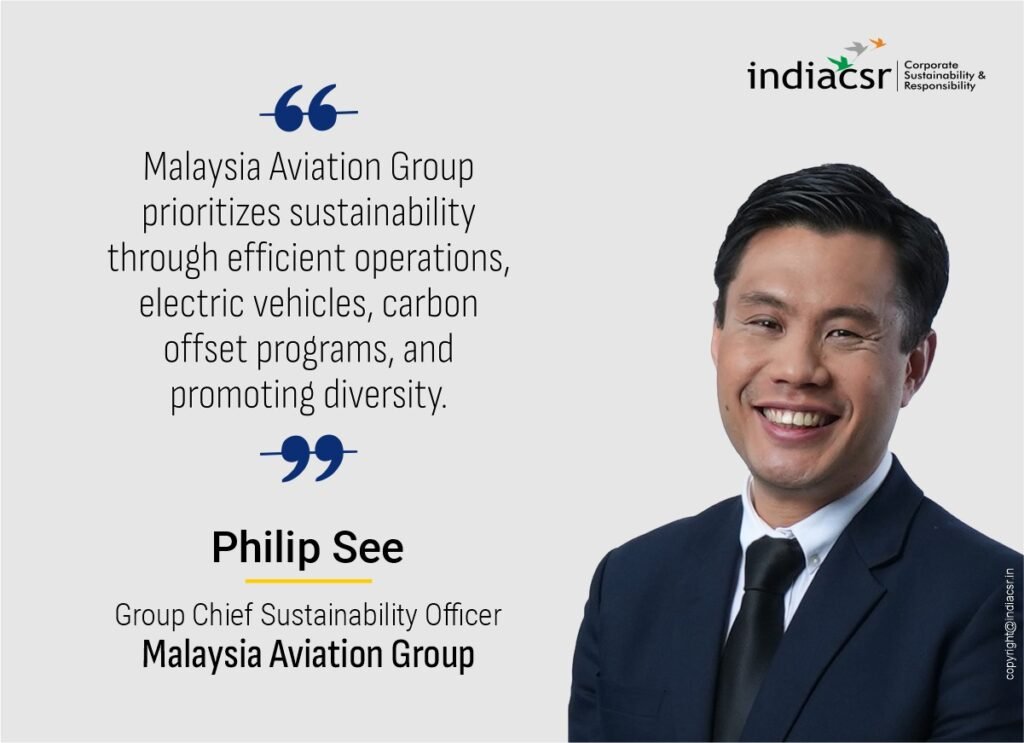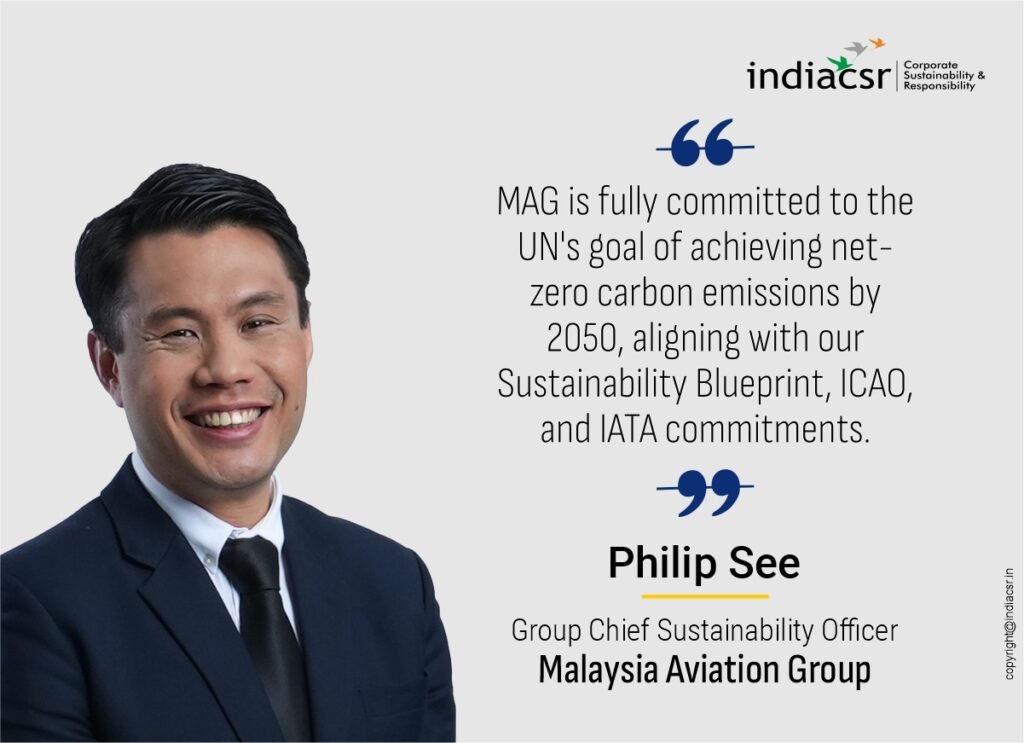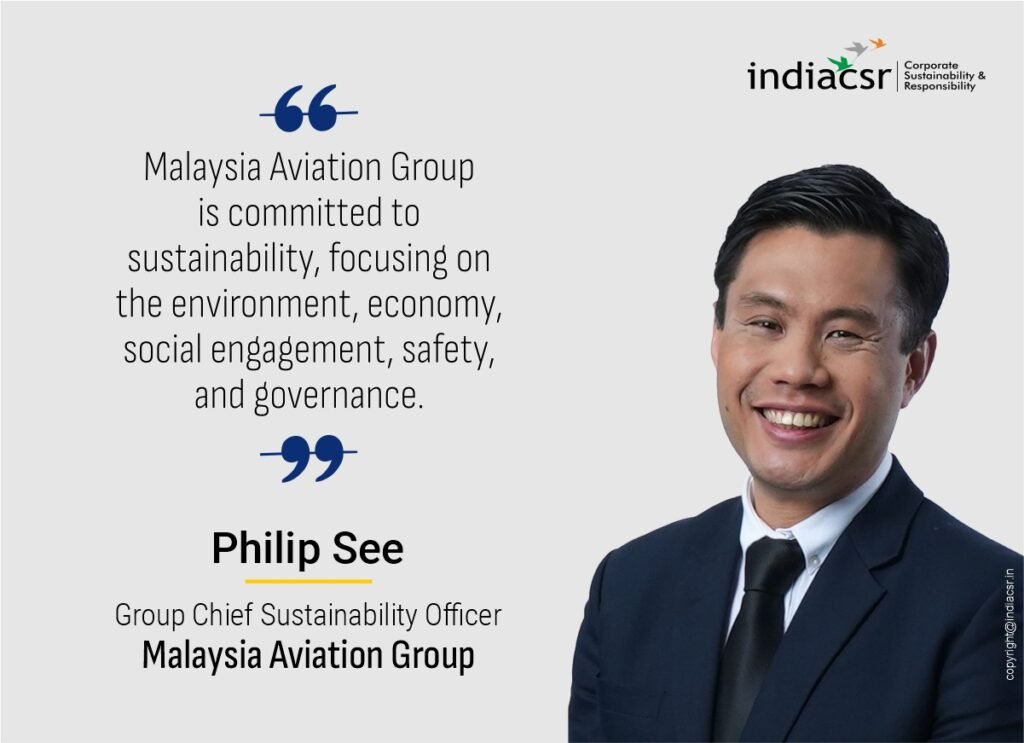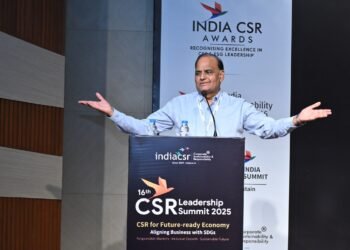
The aviation industry has seen its share of challenges, especially with the burgeoning demand for environmental responsibility. As one of the major players in this space, the Malaysia Aviation Group (MAG) has a pivotal role in paving the way for sustainable aviation practices. In this exclusive interview with Rusen Kumar of India CSR, Philip See, the Group Chief Sustainability Officer of MAG, elucidates the group’s commitment to sustainability.
He sheds light on their holistic approach, encompassing environmental, economic, and social dimensions, and details the tangible steps taken by the organization to reduce its carbon footprint.
Q1. Kindly shed light on Malaysia Aviation Group’s sustainability agenda.
As an environmentally conscious airline, we place significant emphasis on operating sustainably. Our sustainability journey is guided by MAG Sustainability Blueprint which was launched in 2021. The Group’s sustainability agenda is holistic and focusses on environmental, social, and economic sustainability, employee engagement, safety and security, and good governance.
Environment: With regards to environmental sustainability, we actively measure our environmental footprint in all our facilities, as well as within our supply chain. This helps us identify where our greatest environmental impacts are. Additionally, we focus on energy management, waste management, water management, emission management and fuel efficiency. In 2023, we will complete our solar panel installation in our hangar. We are also looking to explore the use of electric vehicles for our ground fleet equipment in 2023.
Economic: Sustainable practices are at the heart of our day-to-day economic operations. We aim to make a positive contribution to the lives of various stakeholders within our value chain, as well as the wider global communities we serve. This ensures that we are profitable and resilient.
Social: We actively engage with our employees and encourage them to be innovative and productive. For this pillar, our focus remains on learning and development, talent management, CSR, culture, and engagement, among others.
Safety and Security: In all the initiatives rolled out by us to drive operational excellence, safety remains a top priority. This includes flight safety, occupational and ground safety, and security. As a testament of the safety factor, MAG has managed to maintain IATA’s Operational Safety Audit (IOSA) and IATA’s Safety Audit for Ground Operation (ISAGO).
Governance: The importance of good governance cannot be understated as it is vital to build trust with our stakeholders and employees. MAG prioritises transparency, accountability, and awareness about whistleblowing channels.

***
Q2. Briefly highlight the key pathways identified by Malaysia Aviation Group to achieve sustainability within its operations.
Operating sustainably is one of MAG’s foremost priorities. Our approach to sustainability is comprehensive, addressing environmental, social, safety, governance, and economic factors. We strive to take measurable actions that contribute to socio-economic development and align with the broader objective set by the UN to achieve net-zero carbon emissions by 2050.
To attain this, the Group has identified four key pathways: aircraft operational efficiency, technological advancements, adoption of SAF, and tapping into carbon markets. MAG has a programme to track GHG emissions, develop a decarbonisation road map, renew its fleet, install solar panels, and manage waste to reduce ground emissions.
The Group has undertaken a range of measures to advance the sustainability agenda. These include using electric vehicles for ground handling solutions, engaging with local NGOs to upcycle crew uniforms and in-flight materials into functional pieces, and incorporating more biodegradable materials in in-flight products.
We have also launched a voluntary carbon offset program for our passengers. The Carbon Offset Programme empowers customers to actively mitigate their carbon footprint and contribute to a greener future.
Besides all this, we are also focussed on increasing the representation of female employees in technical roles and reducing income inequalities.
***
Q3. What is MAG’s stance on UN’s goal of net-zero carbon emissions by 2050?
Driven by the rapid growth in air travel, the aviation sector has become one of the fastest-growing contributors to greenhouse gas emissions. Considering this, the United Nations has adopted a collective goal of achieving net-zero carbon emissions for the global aviation sector.
As an organisation, MAG is fully committed to achieving net-zero carbon emissions by 2050, in line with its Sustainability Blueprint and its commitment to International Civil Aviation Organization (ICAO) and International Air Transport Association (IATA).

***
Q4. With reference to the sustainability agenda, what measures have been undertaken by the group to reduce its carbon footprint?
While we continue to grow as an airline and expand our network, we remain highly focused on reducing our carbon footprint. In line with our sustainability agenda, we have undertaken several eco-friendly initiatives. At MAG, we are voluntarily participating in the Carbon Offsetting and Reduction Scheme for International Aviation (CORSIA).
This means that Malaysia Airlines will have offsetting obligations in the future to ensure that any increase in emissions (whether through the expansion of operations or an increase in frequencies) is compensated through the purchase of carbon credits.
We have also adopted the GHG Protocol Corporate Accounting and Reporting Standard, which covers the accounting and reporting of seven GHG emissions covered by the Kyoto Protocol. We collaborated with Sustainable Energy Development Authority Malaysia (SEDA) to install solar panels at the MASkargo facilities – the cargo business arm of MAG, which reduces our reliance on Malaysia’s electrical grid, thus decreasing Scope 2 emissions.
Furthermore, our fuel efficiency programme has been running for more than a decade, of which the last few years saw an astounding fuel burn improvement. Data analytics has been at the centre of the programme, facilitating improvements in systems infrastructure and capabilities. Considering fleet modernisation, all of our new aircraft will reduce environmental impacts as the aircraft consumes 11% to 14% less fuel than our current fleet thus significantly lowering our carbon emissions.
Notably, sustainable aviation fuel (SAF) has been recognised as one of the most potent ways to reduce carbon emissions and footprint. MAG has been a pioneer in the usage of SAF in Malaysian aviation, having conducted 19 awareness flights powered by SAF since December 2021 through its airline subsidiaries – Malaysia Airlines, Firefly, and MASwings. We are also planning for more SAF-powered flights in the future. Through this, we aim to make a positive contribution to not only the industry but also to the future of our planet.
***

Q5. Is Malaysia Airlines looking at new partnerships to promote the cause of a ‘Sustainable Tomorrow’?
We are actively engaged with an offsetting partner for our voluntary carbon offset initiative, providing passengers with the opportunity to offset the carbon emissions associated with their journeys. The 3 offset projects selected for our portfolio include The Katingan Mentaya Project, Rimba Raya and Theparak Wind Farm within the price range of $5.00 to $8.00 per tonne of CO2. These projects focus on nature-based and renewable energy solutions.
In 2022, Malaysia Airlines partnered with WWF-Malaysia to contribute to forest conservation initiatives in Batang Ai, Sarawak. This collaboration involved engaging passengers on all flights to make donations during the booking process, with the entire proceeds being directed towards WWF-Malaysia. This effort aims to offer local communities an alternative income source while safeguarding and enriching the valuable forest area, ultimately benefiting the cherished orangutan population.
In early 2023, MAG partnered with Tata Consultancy Services (TCS) and National Cancer Society Malaysia (NCSM) to help parents of kids suffering from cancer to assist them in monitoring symptoms through an app (Developed by TCS) enabling NCSM doctors to make better and effective treatments based on data analytics.
MAG also contributed flight tickets for assisting the patient’s transportation to be in Kuala Lumpur for their treatments. This event was the first-ever carnival to entertain and celebrate children with cancer alongside their caregivers.
MAG and Petronas Dagangan Berhad (PDB) joined forces to establish the first sustainable aviation fuel (SAF) production in Malaysia on a commercial scale. This collaboration involves MAG committing to purchase blended SAF from PDB, to achieve net zero carbon emissions by 2050.
The SAF is scheduled to be delivered from 2027 at Kuala Lumpur International Airport and will be used on flights operated by Malaysia Airlines, Firefly, and MASwings.
MAG also partnered with the KK Wetlands Society to organize the ‘Mangrove Tree Planting Project‘ at Lema’as Forest Reserve. A total of 66 MAG volunteers participated and planted 126 mangrove saplings.. The project’s main goal is to promote environmental sustainability and conserve biodiversity, serving as an additional initiative to complement MAG’s ongoing sustainability efforts.

***
Q6. How is Malaysia Airlines planning to spread awareness about sustainability in aviation and shape people’s mindsets?
With the growing urgency to address climate change, consumers are becoming increasingly conscious of the environmental consequences of their decisions. They now seek information about their carbon footprint and expect airlines to support them in making their journeys more sustainable.
Consequently, it is paramount for companies to develop comprehensive plans that significantly minimize their environmental footprint while fostering environmentally conscious workplaces. At MAG, we have kick started the passenger voluntary offset project which will give an option to our passengers to offset their emissions as part of their travel. Through such efforts, we aim to make our customers an integral part of our sustainability journey.
In the long term, our sustainability initiatives will propel us towards becoming a more responsible, efficient, and effective organization. We will cultivate a character and mindset that prioritizes environmental responsibility, exhibit leadership that empowers and enhances our workforce expertise, take on the responsibility of spearheading safety leadership, go beyond mere compliance through our accumulated experience, and demonstrate the ingenuity needed to sustain and enhance profitability and resilience.
(India CSR)
***





















